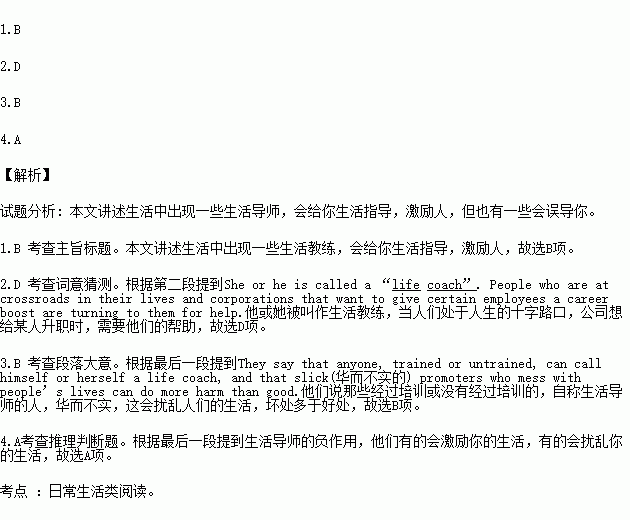ÌâÄ¿ÄÚÈÝ
You¡¯ve probably heard about sports coaches, fitness coaches, vocal music teachers, career counselors, psychiatrists(¾«Éñ²¡Ò½Ê¦) and other specilalists who teach skills and help us cope with daily life.
But there¡¯s a rapidly growing kind of professional who does a little bit of everything. She or he is called a ¡°life coach¡±. People who are at crossroads in their lives and corporations that want to give certain employees a career boost are turning to them for help.
The idea that one person¡¯s success story can change other people¡¯s lives for the better goes back at least to the 1930s. Dale Carnegie¡¯s famous self-improvement program ¡°How to Win Friends and Influence People¡± came along soon thereafter.
But this new style of life coaches includes more than enthusiastic speakers or writers. They use their own experiences in business, sports, military service, or psychotherapy(ÐÄÀíÁÆ·¨) to help others make critical life decisions.
They often give their approach a slogan, such as ¡°energy coaching¡± or ¡°fearless living¡± or ¡°working yourself happy¡±.
Dave Lakhani in Boise, Idaho, for instance, works with salespeople to develop what he calls a ¡°road map¡±. He says an ongoing relationship with a coach is like having a personal fitness trainer for one¡¯s career and life outside work.
Lakhani¡¯s Bold Approach coaching firm also donates some of its time to help people who are anything but successful¡ªincluding battered women and struggling sigle mothers.
But others in the so-called ¡°helping professions¡± are not thrilled about the life-coaching movement. They say that anyone, trained or untrained, can call himself or herself a life coach, and that slick(»ª¶ø²»ÊµµÄ) promoters who mess with people¡¯s lives can do more harm than good.
1.Which of the following is the best title for the passage?
A. Working Yourself Happy
B. Life Coaches Help with Tough Decisions
C. How to Cope with Daily Life with Life Coaches
D. The Life-Coaching Movement
2.The underlined phrase ¡°life coach¡± in Paragraph 2 means ¡° ¡±.
A. the career counselor who teaches skills
B. the psychiatrist who helps us cope with daily life
C. the fitness coach who teaches us lessons
D. the specialist who help us make important life decisions
3.The last paragraph is mainly about .
A. the introductions of life coach
B. the disagreements of life coach
C. the effects of life coach
D. the experiences of life coach
4.What is the author¡¯s attitude towards life coaches?
A. Cautious B. Approving C. Casual D. Disapproving
ÊéÃæ±í´ï
ÎåһС³¤¼Ù¼´½«À´ÁÙ£¬ Äã°àͬѧ¾ÍÎåÒ»¼ÙÆڼƻ®½øÐÐÌÖÂÛ£¬Ìá³öÁ˲»Í¬¿´·¨£¬Çë¸ù¾ÝÌáʾдһƪ¶ÌÎÄ£¬²¢Ì¸Ì¸ÄãµÄ¿´·¨¡£
ÓÅ µã | ȱ µã | |
´ýÔÚ¼ÒÖÐ | »¨·ÑÉÙ¡¢ÊæÊÊ·½±ã | ²»ÄÜÇ×ÉíÁ˽âÍâ½ç |
Íâ³öÂÃÓÎ | Ôö³¤ÖªÊ¶¡¢¿ªÀ«ÑÛ½ç | »¨·Ñ¶à¡¢ÂÃ;²»±ã |
×¢Ò⣺
1 .´ÊÊý100×óÓÒ£¨²»º¬ÒÑдºÃ²¿·Ö£©¡£
2. ¶ÌÎıØÐë°üÀ¨±íÖÐËùÁÐÒªµã£¬¿É¸ù¾ÝÄÚÈݷֶαíÊö¡£
3. ¿ÉÊʵ±Ôö¼Óϸ½Ú£¬ÒÔʹÐÐÎÄÁ¬¹á¡£²Î¿¼´Ê»ã£ºÑÛ½çhorizon (view)
The May Day is coming. Our class has a discussion about what to do during the holiday._______________________________________________________________
____________________________________________________________________________
____________________________________________________________________________
____________________________________________________________________________
____________________________________________________________________________
____________________________________________________________________________

